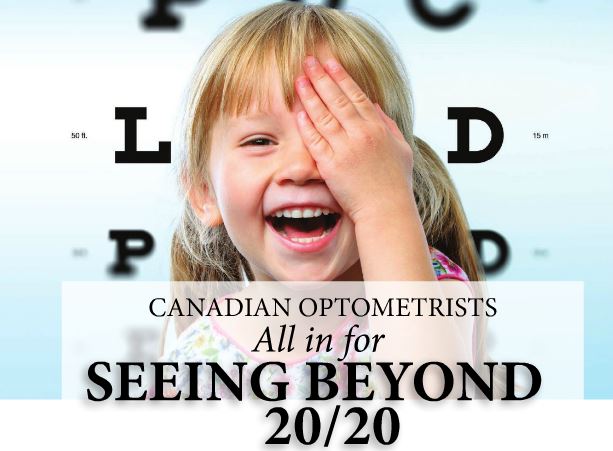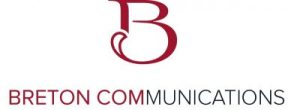Developmental, aka neuro, neuro-developmental or behavioural optometry, is exploding in Canada, thanks to the passion, motivation and energy of the ALL-IN campaign, launched by the Canadian Optometrists in Vision Therapy and Rehabilitation (COVTR). These optometrists provide life-transforming vision therapy and rehabilitation services to their patients via a specialized area of optometric care that works with the eye-brain-body connection.
While a majority of eyecare professionals deal with the health of the eyes — or “hardware” — and provide compensatory prescriptions to their patients so they can see clearly, developmental optometrists describe vision, or the “software”, as a dynamic process that involves more than eyesight. They recognize that vision, as the dominant sense, is pervasive in all aspects of life. It is learned and developed through interaction with the environment and through life experiences. Vision is the entire process that gathers, assembles and integrates sensory and motor information, to and from the brain, body and environment, with what is seen through the eyes. This provides meaning in order to direct accurate, comfortable and efficient motor movements or actions.
Good visual acquisition skills (how we get information into the brain) and good processing skills (how we interpret, use and project visual information) influence human development and provide a foundation for new learning. A breakdown in eye teaming, eye movement and peripheral awareness can happen over time, as a result of visual stress, or following a head injury such as a concussion. Such breakdowns are closely linked to a reduction in depth perception and balance, inefficient processing and uncomfortable vision. When undiagnosed, vision problems can become barriers to success in academics, sports and life. In the words of the late Dr. John W. Streff of Lancaster, OH, a founding father of the developmental optometry community, “When vision is good, it leads; when it is poor, it interferes.”
Developmental optometrists use powerful tools such as lenses, prisms, tints/filters and vision training to rewire the “programming” or neural pathways and help guide vision development, rehabilitate a compromised visual system and improve visual performance.
COVTR is a three-year-old non-profit organization dedicated to enhancing optometric education and public awareness of vision therapy and rehabilitation (VTR) to improve the lives of Canadians (www.visiontherapycanada.com). It has grown from a group of seven optometrists in a vision therapy study group in 2014 to a national organization representing over 300 members, including optometrists, vision therapists and students.
This rapid growth has resulted in many sold-out continuing education events across Canada. An unprecedented eight Canadian optometrists completed post-graduate training in VTR and obtained fellowships from the College of Optometrists in Vision Development (COVD) in Jacksonville, FL in 2017. The organization is propelling VTR to the forefront of vision care nationwide across Canada and is in the midst of a movement to show that VTR success is not limited to one community or practice – it is everywhere.
Thousands of Canadians are now enrolled as patients in vision therapy and rehabilitation programs across the country. COVTR’s goal is to ensure that all Canadians are informed about VTR and given the opportunity to participate in these life-changing services. The organization’s members are remediating patients with binocular vision dysfunctions, such as convergence insufficiency, and children with learning-related vision problems and academic delays. They offer effective, non-surgical management for patients with eye turns (strabismus) and lazy eyes (amblyopia), and novel ways to alleviate concussion and head injury symptoms, such as dizziness, double vision and light sensitivity, for those with acquired and/or traumatic brain injuries. In addition, athletes who want to develop their visual abilities for optimum results are benefitting from sports vision-enhancement activities.
At COVTR’s 2nd Annual General Meeting and Conference in August, 2017, commemorating a historic 75 years of vision therapy in Montreal, the inaugural class of 2017, made up of 37 vision therapists and two optometrists, graduated from Canada’s first-ever Practical Vision Therapist Accreditation Program (PVTAP). It is an 18-month program, developed in conjunction with a licencing agreement with the Australasian College of Behavioural Optometrists (ACBO), for optometrists and their vision therapists. The goal is to facilitate the successful integration of VTR into their practices by providing participants with the relevant theory and understanding of the development of vision problems and strong practical experience for gold-standard, office-based therapy delivery and management for their patients.
COVTR is making waves, not only in Canada but around the world. And this year, for the first time, Canada will be represented at the International Congress of Behavioural Optometrists (ICBO) event in Sydney, Australia. The landscape of VTR in Canada looks very bright for optometrists who are ALL IN and want to increase their knowledge base to help their patients. Similarly, the outlook is positive for their patients, giving them hope of controlling their visual symptoms and retraining their brains to use their visual systems more effectively and efficiently.
By Shirley Ha
****
This is the first of two developmental optometry stories. The second story will run in an upcoming issue of Envision: seeing beyond magazine.








